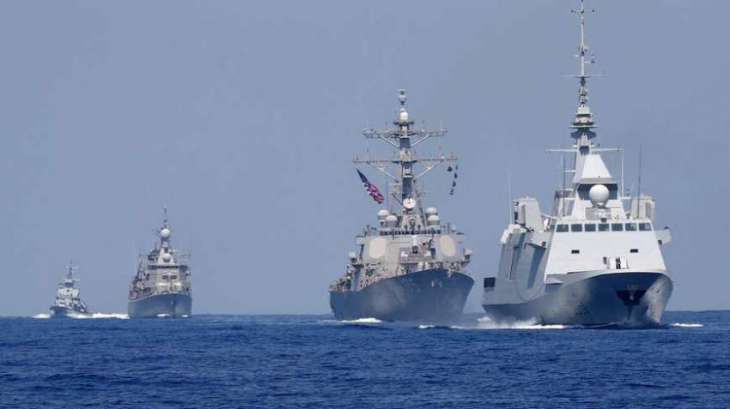The recent naval incident between France and Turkey has put NATO to another test as the former finally halted participation in the alliance's naval mission after failing to see due support in the wake of a dangerous encounter with Turkish vessels in the Mediterranean
BRUSSELS (Pakistan Point News / Sputnik - 03rd July, 2020) The recent naval incident between France and Turkey has put NATO to another test as the former finally halted participation in the alliance's naval mission after failing to see due support in the wake of a dangerous encounter with Turkish vessels in the Mediterranean.
The incident in question happened on June 10, when France's Courbet frigate attempted to check a Tanzanian-flagged cargo ship under the escort of three Turkish vessels over suspicion of trafficking arms to Libya. According to France, Courbet was "illuminated" three times by Turkish naval targeting radar when it tried to approach the freighter. As a result, the frigate had to abandon its mission.
On Wednesday, France declared that it temporarily suspends its participation in NATO's Sea Guardian operation in the Mediterranean, saying that Turkey does not respect the Libya embargo and threatens its allies.
Politico reported that it happened, as France deemed that a NATO report on the incident had failed to establish the facts.
Speaking at the parliament, the French minister of the armed forces called the June incident an "extremely aggressive act" on part of Turkey. Florence Parly stressed that France insists on the "exceptionally grave nature of such an incident between NATO allies."
Turkey is strongly denying illuminating Courbet. The country is, however, suspected of violating the arms embargo on Libya as it provides militarily support to the Tripoli-based government of Fayez Sarraj.
NATO had to open an investigation into the naval incident on June 18. Secretary General Jens Stoltenberg was obviously trying hard to keep impression of unity within the alliance, which has been publicly called into question after President Emmanuel Macron qualified NATO as "brain dead."
The problems within the bloc came to the surface after US President Donald Trump started openly chiding some of his European allies over failing to meet the defense spending target. As part of this logic, the US has recently threatened to halve troops stationed in Germany.
Another headache came from Turkey. Under President Recep Tayyip Erdogan, the country bought Russian S-400 missile defense systems, which the alliance sees as incompatible with its security standards. After failing to make Ankara abandon the deal, the US has excluded it from the F-35 production and procurement project and threatened the ally with sanctions.
In addition, Turkey conducts oil and gas exploration in the immediate vicinity of another NATO ally, Greece. Turkish war planes frequently fly over Greek territory, further contributing to tensions between these NATO "allies."
Ankara also regularly threatens to open the "gates" to Europe for refugees and discontinue the 2016 agreement.
IS GAULLIST-LIKE REACTION POSSIBLE?
In the wake of the naval incident, President Macron accused Turkey of playing a dangerous game in Libya and violating the commitments it made at an international conference in Berlin.
Nicolas Dupont-Aignan, the leader of the Gaullist Debout la France (France Arise) party and a 2017 presidential candidate, went further and called for pulling the country out of NATO's integrated military structure, just as President Charles de Gaulle did in 1966.
"Turkey has threatened a French military boat without any intervention from NATO or a reaction from our European partners ... We ask France and Europe to stop this policy of weakness. That means: To permanently suspend our participation in the NATO integrated military organization," Dupont-Aignan told Sputnik.
According to the politician, President Nicolas Sarkozy, who returned the country to the structure in 2009, pledged that France would only gain more influence, which did not happen. In reality, "NATO despises France," Dupont-Aignan said.
The France Arise leader went on to suggest ending EU subsidies to Turkey, closing the entrance of Turkish products without customs rights, tightening visa policy and even "confiscating the assets of Turkish leaders" in national banks.
Jerome Riviere, a European Parliament member from France's right-wing National Rally party, also called for a firmer response on part of France and Europe.
According to the lawmaker, "Europeans are always complacent and submissive before Erdoğan."
"After direct threats of invasion by migrants, after violations of the territorial waters of Cyprus, a member of the European Union, by illegal Turkish drilling, after the recent threat of Turkish war ships on a French frigate, Turkey continues to receive generous subsidies as part of the pre-accession process," Riviere told Sputnik, calling for an end to this practice.
LEAVING NATO'S NAVAL MISSION IS A MISTAKE?
Military expert Pierre Henrot, a retired NATO officer, however, considers it unrealistic to demand a tough reaction from Europe.
"The EU has no common foreign or defence policy. It is impossible to imagine Ursula von der Leyen or Charles Michel adopting a warrior attitude. As for Chancellor Merkel, she is not going to annoy Erdogan, given the millions of [Turkish ruling party] AKP and [Turkish far-right ultranationalist organization] 'Gray Wolves' supporters in the streets of Germany. She is scared of a reaction," Henrot told Sputnik.
As for France's move to pull out of NATO's naval mission, the expert doubted that it was the right decision.
"Leaving the naval operation is a mistake on the part of the French: the Turks will be able to continue their business without bother," he argued.
According to Henrot, "ultimately, the question will have to be asked: is Turkey still an ally in NATO and a partner for the EU?"
The US, meanwhile, is unlikely to act as a mediator in the conflict, as Trump, busy with the upcoming election, has "nothing to gain from playing the referee at this time," the expert noted.




